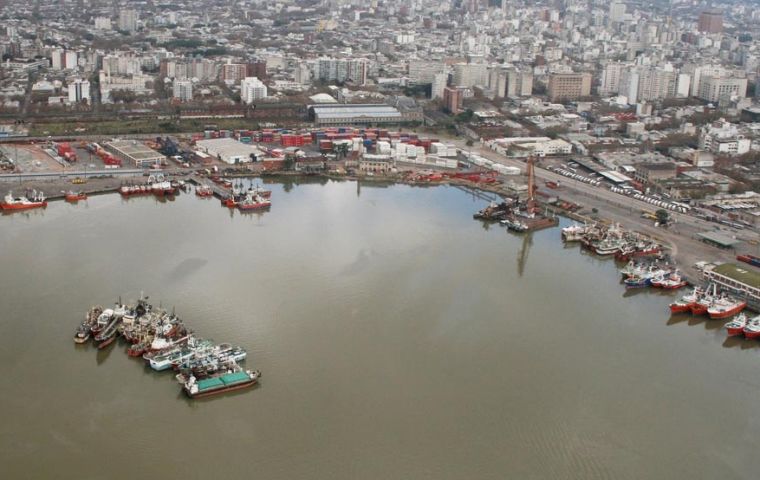MercoPress. South Atlantic News Agency
Spanish fishing vessels threatening to abandon the port of Montevideo
 Jiggers lined up in the port of Montevideo
Jiggers lined up in the port of Montevideo Spanish fishing vessel owners have warned Uruguayan port authorities that they are considering leaving the port of Montevideo because of the costly labour disputes with crew members when the vessels dock, taking advantage of a very ‘misbalanced’ legislation.
An option for the companies is Rio Grande in the south of Brazil and the Falkland Islands which are already working on facilities to improve land transhipments and even do some primary processing.
Spanish companies claim that mostly Peruvian crewmembers on setting foot in Uruguay present before the Labour Ministry, most times “unfounded” claims for overtime pay and other ‘non complied’ contractual benefits.
Vessels involved in the demands are then usually cautionary seized, impeding them from leaving Montevideo to resume fishing operations generating huge losses. At the moment according to Spanish companies with offices in Montevideo, five vessels remain under that situation.
Sometimes to have vessels released, an understanding is reached with the plaintiffs at a cost higher than the sum originally claimed.
The issue was recently brought up by the Uruguayan Minister of Agriculture, Livestock and Fisheries during the regular Monday cabinet meeting and parliamentary committees related to the dispute are now considering the issue.
Montevideo port authorities have warned that the situation not only means fishing vessels leaving possibly for Rio Grande in Brazil, but also it tarnishes the overall image of Montevideo as a reliable, safe, efficient, no-surprises sea terminal in the South Atlantic.
For the Spanish companies seized vessels mean docking and port costs, maintenance expenses plus loss of revenue from fishing and having paid for licences which have limited use.
For the port of Montevideo idle vessels under court seizure is not attractive and is rather a warning for other ship owners.
”We are trying to promote our international fishing port facilities. We want fishing operations to take advantage of Montevideo since we are building exclusive facilities for the fishing industry; all this is most disappointing”, admitted Alberto Díaz president of the Uruguayan National Ports Administration.
Diaz revealed that one of the options under consideration is to replace the seizure of the vessel by a bank deposit or guarantee, but this “will need legislative involvement”.
Mario Baubeta, president of the private Navigation Centre claims there is a solicitors’ organization behind this “costly demands’ industry”, and is strongly lobbying for Parliament to review legislation “that puts an end to these excesses”.
“We are hostages of a most unfair situation, which is ‘legal’ under the current labour dispute legislation”, said Baubeta.
He warned that many fishing vessels are unloading directly in the Falkland Islands which has improved facilities, to avoid the risk of lawsuits in Montevideo. Over seventy Spanish flagged vessels operate in the South Atlantic from Montevideo.
Baubeta also mentioned that in one of the latest cases, the Spanish company offered a bank guarantee of 650.000 US dollars, which was finally rejected by the Uruguayan Labour magistrate…two months later after the presentation was done.




Top Comments
Disclaimer & comment rules-

-

-

Read all comments“ ... An option for the companies is Rio Grande in the south of Brazil and the Falkland Islands which are already working on facilities to improve land transhipments and even do some primary processing....”
Aug 18th, 2010 - 06:02 am 0“ ... He warned that many fishing vessels are unloading directly in the Falkland Islands which has improved facilities, to avoid the risk of lawsuits in Montevideo....”
I see that the blockade is operating with typical Argentine efficiency! All you South American countries standing 'shoulder to shoulder' is indeed a terrifying sight :-)
(1) Hoyt
Aug 18th, 2010 - 11:08 am 0This has nothing to do with any “blockade”
Is a labor conflict where Spanish Fishing Companies underpay and overwork their Peruvian crews.
The same is happening with many Taiwanese an Filipino crews operating in the “Wild West South Atlantic Fishing Zone”
Argentina, Uruguay AND Brazil trade unions are cooperating to force these “Fishing Fleets” to treat and pay their employees acording to ILO rules.
If Malvinas is to become an option for these Fleets, they will have to “accept” this modern form of slavery...... eventually, it will backfire on them....
I would not mind if they abandoned the Atlantic Ocean along the entire coast of South America.
Aug 18th, 2010 - 10:33 pm 0Commenting for this story is now closed.
If you have a Facebook account, become a fan and comment on our Facebook Page!